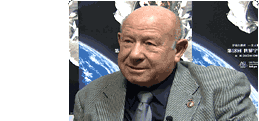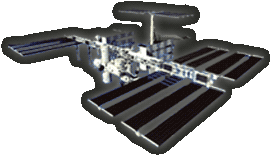Throughout the period that saw the collapse of the Soviet Union and the birth of the Russian Federation, Mr. Leonov played a very important role in his country's manned space projects and cosmonaut training programs. Also, he has befriended many American astronauts, including Russell Schweickart, the other co-founder of the Association of Space Explorers. People involved in space development all over the world take special notice of his words. |
| In Clarke's novel, the spaceship bound for Jupiter is named after Mr. Leonov. The name of the man who survived a life-or-death crisis in the embryonic days of space exploration is an inspiration for the ship's crew. In the real world, the cooperative relationship between the U.S. and the Soviet Union in space development, brought into being by the Apollo-Soyuz project, has evolved into the International Space Station, which now involves 15 countries. Since the start of the project there have been many twists and turns and changes of plans. Rising costs and construction difficulties have become hot topics in many of the participating countries. But nevertheless, the ISS is one of the few "borderless" places. The Japanese experimental module "KIBO" is in Florida at the moment, and is expected to be in orbit and become part of the ISS as early as 2006.
[ Interview : October 16, 2003 ]
|

 The ISS will accommodate up to seven people at one time. Arthur C. Clarke predicted in his novel 2001: A Space Odyssey that an international space station would be completed by 2017, but now its completion is just around the corner.
The ISS will accommodate up to seven people at one time. Arthur C. Clarke predicted in his novel 2001: A Space Odyssey that an international space station would be completed by 2017, but now its completion is just around the corner.